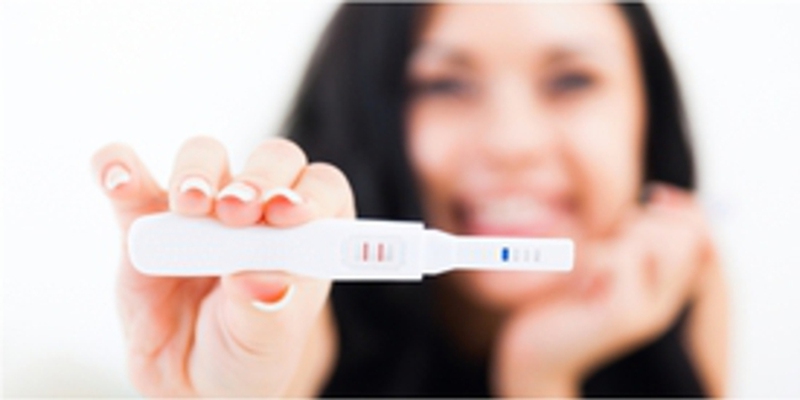Going through a miscarriage is a completely devastating and sometimes traumatizing experience for a family. Losing a child, either in the early stages of pregnancy or into adulthood, is what most people consider the most heartbreaking life event one could endure. Whilst enduring this heartache, you may feel a compulsion to take a pregnancy test after miscarriage just to confirm it. Then you may find the result is still positive. But it usually does not mean that you have had a false diagnosis. Read on to find the reason.

Why Is the Pregnancy Test Still Positive After Miscarriage?
The human chorionic gonadotropin hormone, often known as hCG, is the hormone that a pregnancy test senses. HCG does not normally exist in the body when you’re not pregnant, so an hCG detection is a surefire way to know you’re pregnant.
After the loss of a baby in the uterus, the pregnancy hormone doesn’t just disappear immediately. How far along you are into the pregnancy will determine how many days or weeks it will take for the hCG levels to return to zero. On average, this window of time is about 19 days. Taking a pregnancy test after miscarriage will likely give you a positive result, since modern technology has made these tests super sensitive to even very low amounts of hCG. It is also not uncommon to continue experiencing pregnancy symptoms after a miscarriage.
Urine hCG and serum hCG decreases at approximately the same rate, and it’s generally between 9 and 35 days, averaging out around 19 days. For example, experiencing a miscarriage at 8 to 10 weeks will take the hCG level the longest time to return to zero.
When to Consult a Health Professional
If after a few weeks from miscarriage your pregnancy test is still coming out positive, it is time to call your doctor. You doctor needs to evaluate your blood and examine your hCG level. Despite miscarriage, some pregnancy tissue may still be present in your uterus. This means you have had an incomplete miscarriage. An incomplete miscarriage unfortunately does not mean the pregnancy can be saved.
In order to complete the miscarriage, an easy surgical procedure would need to take place. This is called a D&C. This procedure will remove the tissue that has been leftover. While your body can break down this tissue on its own, surgery can relieve symptoms like heavy bleeding much sooner.
Is There Any Chance That You Are Pregnant Again?
If after your miscarriage, you have been sexually active and your pregnancy test after miscarriage shows a positive result, then you may be pregnant again. Your doctor will be able to determine a new pregnancy or an incomplete miscarriage. Of course, if pregnancy is not the desired outcome, it is best to use contraception to prevent a potential pregnancy if you are not ready.
Miscarriages are devastating and you should not ignore your grief. It’s important to grieve properly and thoroughly before focusing on getting pregnant again. Generally, for at least two weeks following a miscarriage, you should abstain from sex. This is to prevent infection. Usually the first period will come within six weeks. At this point it is safe to try to get pregnant again, with advice from your doctor. You can also get pregnant before your first period.
It is difficult to safely prevent a miscarriage, as they are so unpredictable. Staying healthy and active and taking care of your body is the best thing you can do. Take prenatal vitamins for a couple of months before trying to conceive. Stay away from alcohol, drugs, and cigarettes as well. Lessen your caffeine intake and maintain a good weight.
Will You Have Another Miscarriage in Later Pregnancy?
The good news is that most women who miscarry will have perfectly healthy pregnancies and babies. There is just a tiny fraction of women (only 1 percent) who will experience another miscarriage. The risk of miscarrying again after a first miscarriage is about 14 percent and that number increases with more miscarriages. After two miscarriages, the risk goes up to 26 percent. And after a third miscarriage, the risk is at 28 percent.
Are There Any Tests to Take Before Getting Pregnant Again After Miscarriage?
Hysteroscopy
Using a hysteroscope, a skinny instrument with a light, your doctor will enter your cervix to diagnose problematic intrauterine conditions.
Hysterosalpingography
A catheter will be inserted into your cervix and a liquid contrast will be released. The contrast will fill your uterus and fallopian tubes, which makes them more visible in an X-ray. If there are any problems on the internal contours of your uterus, or blocks in the fallopian tubes, the hysterosalpingography will detect them.
Ultrasound
An ultrasound device, otherwise known as a transducer, will be placed on your abdomen or inside the vagina. High frequency sound waves will make a picture of your uterus, and can detect problems like fibroids.
You Are Not Alone
I miscarried at 4 weeks. Bleeding stopped after a week, and it’s been 3 weeks since then, but my pregnancy test after miscarriage is still positive. One week after the bleeding stopped, the scans showed everything was back to normal again. I just want to move on and try to get pregnant again.
I miscarried on May 9th. My hCG level was at 400 that day, a couple days later it was down to 67, and then by the 19th it was 4. I had a positive pregnancy test on June 6th, and the doctor told me my hCG was up to 200 again. Now it’s at 4,500. I’m pregnant! I’m 3 weeks along and the miscarriage was only 5 weeks ago. I can only pray that this time around, everything will work out.



View All Comments /Add Comment